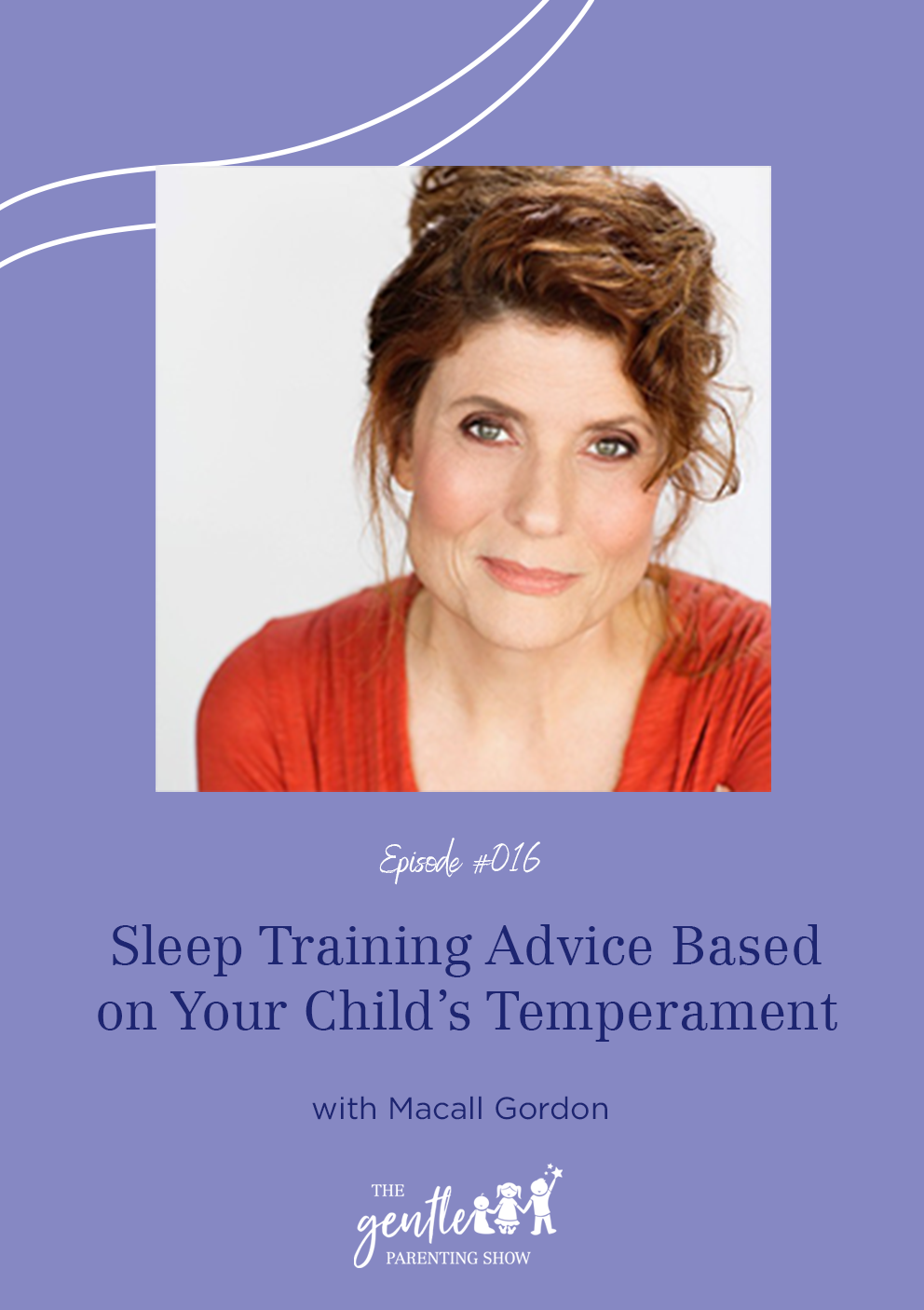In today’s episode of the Gentle Parenting Podcast, Kim West sits down with longtime friend and certified Gentle Sleep Coach, Macall Gordon. This is Macall’s second time on the podcast, to listen to her first episode all about sleep training research, head HERE. Macall holds an MA in Applied Psychology from Antioch University, Seattle with a specialization in infant mental health, including attachment theory, the development of emotional regulation, and parenting psychology (including the transition to parenthood, postpartum depression, etc.). She also has a BS in Human Biology from Stanford University. She is currently a Senior Lecturer in the graduate Counseling Psychology program at Antioch University Seattle.
Kim and Macall sat down to discuss sleep training based on a child’s temperament. They speak specifically about alert, high-wired and high-energy children, and how common sleep training advice can be adapted based on this type of child.
What Does Temperament Mean?
Macall likes to call babies who are alert and high-energy “live wires”. She believes that if we surveyed sleep coaches that the line between kids who sleep and those who don’t sleep all comes down to temperament. As sleep coaches, Kim and Macall don’t see those children who sleep easily, but rather those who aren’t, hence their high experience with these live-wired children. Macall recalls that her first child was one of these live-wired babies. From one of her earliest days in the hospital, the baby had laser beam-like eyes, taking everything and anything in. She wasn’t missing a thing.
Children who are more alert and highly energized, are just “ON” most of the time. Parents who have a lower energy child sometimes think it’s because they did something “right” when in reality, it’s just the natural temperament of their child. A lot of parents who do have children like this will often give advice to those with higher energy children. But, this is a huge disservice to those parents with high-energy children. Often differences in discipline, sleeping, talking, eating, etc. has everything to do with temperament and not parenting.
Sleep Training Based on Temperament
The biggest sleep training hurdle with these live-wired kids is that they can’t self-soothe. They take in the world in such a wide way, that it’s hard to shut it out and settle down to sleep. Whatever skills they have aren’t big enough to take in the rapid changes with sleep training.
When it comes to sleep training these children, parents may have to step in more often. Macall says “to really self soothe requires motor skills, attention skills, and your child has to divert their attention, and all those things take time. When the things that are bothering your child take more attention, they need more help to settle down.”
Characteristics of Hard Sleepers
Macall has found that there are a few characteristics that are common amongst children that are difficult to sleep train. Your child might not show all of these characteristics, but through her years of sleep coaching, these are the ones that stick out the most.
- Intensity – Macall describes this as having big feelings. These aren’t necessarily negative big feelings, but if your child reacts in a large way to happy, exciting, sad, and scary things, then they have big feelings.
- Sensitivity – usually a sign of a live-wired child is that they have high sensory sensitivity. In terms of sleeping, this is usually sensitivity to light and texture.
- Persistence – this would be a child who never gives up. Crying it out would never work for this child because they would never give it up.
- Perceptive – a perceptive child never misses a thing. It’s almost as if they have a fear of missing out and don’t want to sleep and miss anything.
- Desire – high-energy children often have a huge desire for things to happen. They can get overloaded easily and need breaks to settle down.
- Emotional Sensitivity – as a live-wired baby grows, it can often show itself into emotional sensitivity. This can present as perfectionism and a high desire to achieve.
Connection Between and Parents and Baby’s Temperament
Macall said that one of her most asked questions is if the temperament of a parent has any effect on the temperament of a child. She said that generally yes, there is some sort of connection. But as adults, we don’t spend a lot of time thinking about our own temperament. Also, today’s parents grew up in a different time. A lot of behaviors were criticized so harshly that we were conditioned to stop them. Comments like “you’re too sensitive” or “you’re too stubborn” can often diminish a child’s temperament.
Both Macall and Kim agree that it sometimes takes having kids to learn about yourself. Macall shared that she realized she’s intense and highly sensitive to certain senses. In the process of parenting kids, everything comes up.
The Good Side of Your Child’s Temperament
Another question that Macall is often asked is if a live-wired child may end up having ADHD. Macall’s answer is they don’t, at least no more than the average.
Macall uses this opportunity to share that you should find ways to channel your child’s intensity into something great. In fact, both Macall and Kim have shared that some of their most highly tempered sleep training clients have turned into successful and determine teens and adults (they’ve been doing this long enough to know). As these high energized children grow, they can detect and internalize things. This is all packaged into some phenomenal abilities and personalities. Macall believes that if parents were able to pay attention to the good sides of having an alert child, it would help them cope with some of the more difficult moments.
Research on Sleep Training and Temperament
In a recent survey about temperament, Macall saw that kids who are labeled as “difficult” often score higher on things like intuitiveness, empathy, and persistence. These survey results helped some of Macall’s clients view their children in a different way.
She also discovered that for every increase in temperament (going easy to difficult) there was an increase in something else too. Even though temperament is highly influential on every sleep problem, there are a lot of positive attributes that come with it too.
A sad reality is that parents of high temperament children often think less of themselves and their parenting skills. They have more challenging kids, they’re working hard and they think they aren’t doing a good job. Not a lot of current parenting advice works for high temperament children. Parents take common advice, find that nothing works, and then the parents turn that into themselves. But, know that you might not see the payoff of your hard parenting right away. With a lot of these high temperament children, the payoff comes down the road.
Kim shares that even though her younger child had a more difficult temperament, it taught her how to become a better parent, a better Sleep Lady. It took a lot of trial and error, and a strong sense of self for Kim to get through it.
Macall’s Findings on Sleep Training and Temperament
Macall found that most parents with high-tempered children have tried almost every sleep training “method” with no success. In fact, they usually try more approaches than parents of mellow babies. A lot of parents with high-energy children are in fight or flight mode – they do outrageous things to get their children to sleep.
Macall’s advice for any parent reading is to reach out for help! Get help before you hit your breaking point. Find mental health support for yourself, friends to parent with, and find the right advice for your high-energy child.
When it comes to sleep training these children, you do need drastic approaches. Anything you change is going to feel massive and hard, so there’s no need to take baby steps. Macall warns that the first night of sleeping training is going to feel terrible. It’s going to look like it’s not working. If you can push through and be supportive for these first few days, you will see something stick.
Takeaway’s
Kim and Macall go over the top takeaways from this conversation:
- There is light at the end of the tunnel. It might take more time and help, but there is hope.
- There are so many wonderful qualities that your high temperament child has that you might need to remember in times of hardship.
- It’s ok to just aim for better, you might not hit every target but just try to be better. Macall quoted “pick your battles, but fight the ones you pick.”
- Push through the pushback, in a gentle supportive way. They will hate change, but if we help them and we’re with them, it’s ok to ask them to change.
- If you’re in burnout mode, it’s not ok for anyone involved. Get help.
Learn More From Macall
- Macall’s WEBSITE Little Livewires





